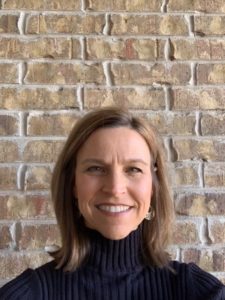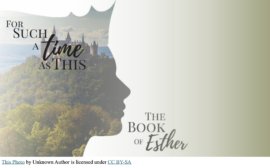By Deanna Huff, Th.M., Ph.D. | February 2, 2024
Is God really there for me? God, do you see? Do you hear my prayer? Experiences such as job loss, broken relationships, mental illness, or any unyielding pain can stir up questions of doubt. Doubt is standing at your door desiring to chip away at your faith. During these seasons of sorrow and pain, many days can be filled with questions like: Why are you silent? Why didn’t you save them? Why won’t you show them they are wrong? Will you resolve the situation? When you feel as if there is no answer, doubt festers. Is what I believe true? Lest someone think that non-religious persons are different, C.S. Lewis’ personal comment is very instructive. He writes, “Now that I am a Christian, I do have moods in which the whole thing looks very improbable, but when I was an atheist, I had moods in which Christianity looked terribly probable.”[1] Evidence can aid in dismantling doubts, and though far from being exhaustive, this article will highlight three reassurances that can start the process of dismantling those doubts about Christianity.
Evidence Reassures
When you doubt, remember you are not alone. Recall John the Baptist who appears to be wrestling with doubt while he is in prison. Although he had baptized Christ, he is later taken to prison and questions if Jesus is the Messiah. Matthew writes, “Now when John, while imprisoned, heard of the works of Christ, he sent word by his disciples and said to Him, “Are You the Expected One, or shall we look for someone else?” We don’t know exactly what John was thinking, but we do know he is seemingly doubting. Jesus lovingly responds without rebuke and instead sends word of the miracles. Matthew writes, “Jesus answered and said to them, “Go and report to John what you hear and see: the blind receive sight and the lame walk, the lepers are cleansed, and the deaf hear, the dead are raised up, and the poor have the gospel preached to them” (Matt 11:4 NASB). The miracles are delivered as signs of comfort to reassure, strengthen, and dismantle the doubt John is experiencing.
Evidence Reminds
Now you might be wondering, where is my miracle to solve my pain and sorrow? It’s possible John the Baptist could have asked the same question. C. S. Lewis notes it seems easy to believe when you are not the patient, but suppose you are in surgery with a good surgeon with wholly good intentions. Lewis writes, “If he yielded to your entreaties if he stopped before the operation was complete, all the pain up to that point would have been useless.”[2] God reminds us in pain that he is with us and doing something, just like he was with Joseph in the Old Testament (Acts 7:9; 2 Cor 4:16-18; Rom 5:3-5). Remember when Job was suffering, and his wife wanted him to curse God? He asked a significant question, “Shall we indeed accept good from God and not accept adversity” (Job 2:10)?
In times of questioning and doubt, who is Jesus? He is the Son of Man who came to serve and to give His life as a ransom for many (Matt 20:28). His life reminds us of his love for us. The eyewitness accounts remind us that Jesus, too, suffered for a little while, but ultimately, He conquered death. 1 Corinthians 15:3-7 spotlights the eyewitness accounts of Jesus’ death, burial, and resurrection. Paul writes to remind the believer that Cephas, James, the Twelve, and more than five hundred brothers, and sisters witnessed Christ overcoming death.
Evidence Transforms
The disciples in 1 Corinthians 15:3-7 are the same disciples who had earlier abandoned Jesus during his trial before his crucifixion. The ones that lacked the courage to stand with Jesus possibly due to their doubts or uncertainty. What changed? Jesus’ disciples and Paul were transformed after their encounter with the risen Jesus. They became bold witnesses willing to die for Christ. Paul changed from persecuting Christians to sharing the gospel with the world. Why would anyone be willing to face persecution or die for something that is untrue? Sean McDowell attests regarding the Apostles of Christ historically “The evidence shows that some really died as martyrs, and that none recanted.”[3]
Transformation for people happens all the time; what is different about the disciples? They were eyewitnesses; they did not believe in a tradition. They believed what they saw firsthand. Too, these transformational encounters with the risen Jesus provide hope for us in our doubt. John is providing encouragement to the followers of Jesus stating, “These things I have written to you who believe in the name of the Son of God, so that you may know that you have eternal life” (1 John 5:13). It is so we may know and believe. This is encouragement for all believers.
Conclusion
In conclusion, please note this is not a one-stop article that erases all doubt or pain, but it is a reminder that you are not alone in your doubt, and contemplating the evidence can reassure, remind, and transform our hearts through the work of the Holy Spirit. God is there for you and uses human agents in the Church to encourage us as we wrestle with doubt. People have wrestled with the ways of God throughout the Psalms and many other pages of the Bible. But hopefully, as you work through your doubts, this evidence can play a role in strengthening the weary traveler. The disciples testify to the risen Lord. He will one day establish a government with perfect justice and love. He will wipe away every tear, and suffering will be no more; doubt will be gone. Until then, don’t lose heart in your doubts; wrestle through them and ask God to dismantle doubts by reassuring, reminding, and transforming you to see with his eyes and heart.
About the Author

Deanna Huff, Th.M., Ph.D.: Associate Vice President of Spiritual Care and Outreach, Assistant Editor, Publisher, and Contributor
She has been teaching and training for the last twenty years equipping people to know their Christian faith and share it with others. Deanna has led many seminars for the Baptist General Convention of Oklahoma, Oklahoma Ladies Retreat, and the State Evangelism Conference. She taught high school students for ten years at Christian Heritage Academy, in Bible, Universal History, Apologetics and Philosophy. Deanna earned a Ph.D. in Theology and Apologetics at Liberty University. She holds a Master of Theology in Apologetics and Worldview from Southern Baptist Theological Seminary, a Master of Divinity with Biblical Languages from Southwestern Baptist Theological Seminary and a Bachelor of Arts from the University of Oklahoma.
Deanna is an active member of Capitol Hill Baptist Church where she participates with her pastor in a worldview podcast called The Analysis. She also participates with her daughter in a podcast called but why should i care. She and her husband teach an adult Sunday school class discipling others in the faith.
Notes
[1] Gary Habermas, Dealing with Doubt (Cambridge, Ohio: Christian Publishing House, 2022), 10.
[2] C. S. Lewis, A Grief Observed (New York, NY: Harper One, 1961), 43.
[3] Sean McDowell, The Fate of the Apostles (Burlington, VA: Ashgate Publishing, 2015), 260.





